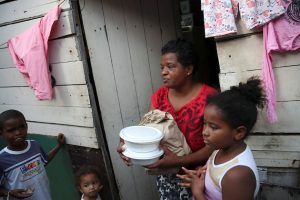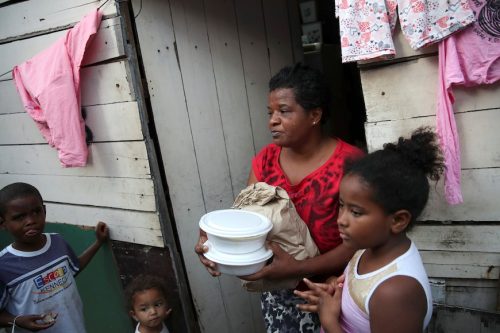By Lise Alves | OSV News
SÃO PAULO (OSV News) — The National Conference of Bishops of Brazil (CNBB) announced Feb. 22 the theme for its annual Lenten Fraternity Campaign: “Fraternity and Hunger.”
“The increase of the number of people living at an acute level of food insecurity cannot be overlooked,” said Auxiliary Bishop Joel Portella Amado of the Archdiocese of Rio de Janeiro and secretary-general of the CNBB, during a press conference to announce the campaign.
“If the hunger of a single person already bothers us, how can we become indifferent to the hunger of countless brothers and sisters?” asked the bishop.
According to a June 2022 study by the Brazilian Research Network on Sovereignty and Food and Nutrition Security, 33.1 million people (15.5% of the population) do not have enough to eat daily in Brazil. The number is almost double what was estimated in 2020. The report also shows that in 58.1% of households there is some level of food insecurity.
According to the CNBB, the 2023 Fraternity Campaign has the objective of bringing awareness to the millions of people going hungry in the country and is a call to action by the church.
“It is a set of reflections and actions that must involve the entire church, overflowing to all of society,” states the campaign handbook.

During another press conference, this time held by the Archdiocese of São Paulo, Cardinal Odílo Scherer stated that the growing number of people suffering from hunger has been noticed during the last few years in rural areas, Indigenous reserves and large urban centers.
“The problem of hunger should upset everyone, but we Christians should question what we do and why hunger exists, what are its causes and how they can be overcome,” Cardinal Scherer said.
This is the third time hunger has been addressed by the Catholic Church in Brazil through the Fraternity Campaign. For the CNBB secretary general, however, the difference between the campaign in 2023 and the other two (in 1975 and 1985) is this year’s invitation for the faithful to act on the problem.
“Do whatever is possible for this situation to be extinguished, even if we have to take the first step. We need to think about the lack of charity and insensitivity in the face of pain. Solidarity begins with very simple postures,” Bishop Amado said.
“The Fraternity Campaign is a call to realism, to step out of the world of ideas and step into reality. Fraternity is not built on the level of ideas, it is necessary to go into action,” said Cardinal Scherer, urging all Catholics to get involved in some way in the fight against hunger.
Pope Francis sent a message to the faithful in Brazil Feb. 22, encouraging local Catholics to “turn our gaze to our most needy brothers and sisters, affected by the scourge of hunger.”
“It is my great desire that reflection on the theme of hunger lead not only to concrete actions that come in an immediate way to help the neediest brothers, but also generate in everyone the awareness that sharing the gifts that the Lord bestows upon us in his goodness cannot be restricted to a moment,” wrote the pontiff.
“It must be a constant attitude of all of us, which commits us to Christ present in everyone who goes hungry,” Pope Francis concluded.
Brazil’s annual Fraternity Campaign was created in 1961, when three priests responsible for Caritas Brasil devised a campaign to raise funds for charitable activities. The endeavor, then called Campaign of Fraternity, was carried out for the first time in Lent 1962, in the city of Natal, and went national during Lent 1964.
Two years ago, the Lenten campaign sparked controversy when a 2021 campaign titled “Fraternity and Dialogue: Commitment of Love” mentioned the “politics of violence” aimed at Brazil’s LGBT community.
This year’s campaign is timely given the severe health care and hunger crisis affecting the Yanomami Indigenous people in Roraima state.
It prompted the Brazilian church to coordinate help and to work side by side with government agencies and Indigenous organizations to provide food and medical attention to the sick.






















